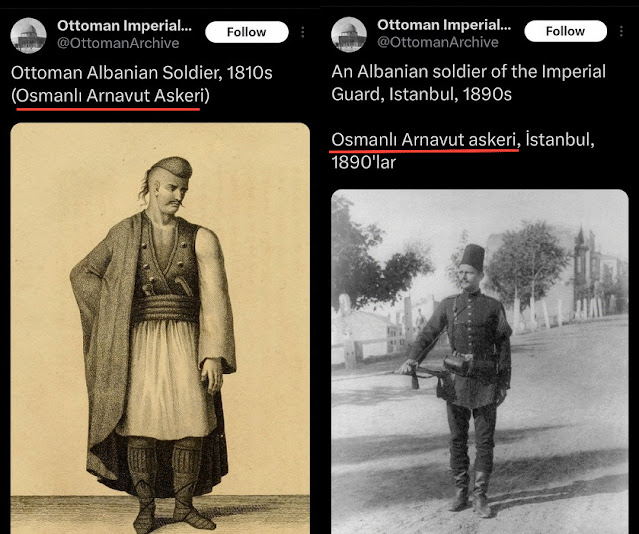Italian Military Guide in 1915- Albania is not a State or a Nation
The Italian Military Guide in 1915 published by the Italian Ministry of war gives a description of Albania. (Guida Militare Italiane jep nje pershkrim te Shqiperise ne 1915)
The author says that Albanians are not a state or a nation and while towards the South the Hellenic element, from upper Epirus, goes up to the line of Argyrocastro Permeti.
"Shqiptarët, në gjendjen e tyre aktuale, nuk përbëjnë as një shtet e as një komb, me lidhje etnografike dhe politike të përcaktuara mirë dhe të dallueshme, por vetëm një popull që mund të gjurmonte lidhjet e ndërsjella të solidaritetit...ndërsa në drejtim të jugut elementi Helen, nga Epiri i sipërm, shkon deri në vijën e Argyrocastro Premetit..."
The author: The origins of the Albanian people are uncertain. Only it is certain that the names Albania and Albanians came into use general in the 15th century, after prolonged battles against the Turks (lies about Turks). In classical Greco-Roman antiquity, upper and middle Albania, with current Montenegro, constituted Illyricum proper; and the lower Albania the Epirus"
Autori: Origjina e popullit shqiptar është e paqartë. Është e sigurt vetëm se emrat Albania dhe Shqiptarët kanë hyrë në përdorim të përgjithshëm në shekullin e 15-të, pas betejave të stërzgjatura kundër turqve . Në antikitetin klasik greko-romak, Shqipëria e sipërme dhe e mesme, me Malin e Zi aktual, përbënin Ilirikun; dhe Shqipëria e poshtme quhej Epir"
The author says: "On the other hand, the oppressive influence of the old Turkish regime is still felt in Epirus. But in that region the Albanian people competed either by abandoning themselves to the Greek influence - which constantly spreads through the southern valleys and to which the Epirote populations feel strongly attracted by their ethnographic bond - or by finding compensation in the improvised cantonal autonomies"
Autori thote: "Nga ana tjetër, ndikimi shtypës i regjimit të vjetër Turk ndihet ende në Epir. Por në atë rajon populli Shqiptar konkurroi ose duke iu dorëzuar ndikimit grek - i cili përhapet vazhdimisht nëpër luginat jugore dhe ndaj të cilit popullsia Epirote ndihet e tërhequr fort nga lidhja e tyre etnografike - ose duke gjetur kompensim në autonomitë e improvizuara kantonale"
The author says that Albanians spoke Albanian at home but Greek was the official language. Other languages spoken were Turkish and Slavic. The orthodox were predominant in the upper Vjossa river and in South of Epirus.Albanians live in tribes they are patriarchal and primitive.Ochrid, Durazzo, Argyrocastro, Berat, Ioanina, Paramithia, Preveza and Valona had their headquarters of Orthodox seats.
Autori thotë se Shqiptarët flisnin Shqip në shtëpi, por Greqishtja ishte gjuha zyrtare. Gjuhët e tjera të folura ishin Turqishtja dhe Sllavishtja. Ortodoksët ishin mbizotërues në lumin Vjossa e sipërme dhe në jug të Epirit. Shqiptarët jetojnë në fise ata janë patriarkalë dhe primitivë. Ochrid, Durazzo, Argyrocastro, Berati, Janina, Paramithia, Preveza dhe Valona kishin selitë e tyre Ortodokse.
The author: "Janina. This city is surrounded by 20 to 25 thousand inhabitants. Rich in resources, it is surrounded by a plain largely cultivated with wheat and corn, less so in the northern area. It is home to the Greek army corps"
The author: "The Ghegh tribes especially, who converted largely to Islamism solely to take advantage of the advantages and privileges inherent to this condition - fighting with the Porte every time it attempted to impose a regular administration on them - they are, on the other hand, ultimately still attached to Turkism, which was able to leave them free and which called many of their people to the highest government positions"
"Fiset Gegë, të cilët u konvertuan kryesisht në Islamizëm vetëm për të përfituar nga avantazhet dhe privilegjet e qenësishme të kësaj gjendje - duke luftuar me Portën Turke sa herë që ajo u përpoq t'u impononte një administratë të rregullt - nga ana tjetër, ata janë, në fund të fundit, ende të lidhur me Turqizmin, i cili mundi t'i linte të lirë dhe që vuri shumë nga njerëzit e tyre në postet më të larta qeveritare"
The author: The home-making of butter, but especially of cheese, is very common in Epirus; However very primitive (he lies we make butter everyday). In Janina and Scutari there are small factories of laundry soap. The production of leather, red morocco leather, is widespread in Epirus. and yellow, for shoes and harnesses...
(Prodhimi në shtëpi i gjalpit, por veçanërisht i djathit, është shumë i zakonshëm në Epir; Megjithatë shumë primitiv (ai gënjen që ne bëjmë gjalpë çdo ditë). Në Janinë dhe Shkodër ka fabrika të vogla sapuni lavanderie. Në Epir është i përhapur prodhimi i lëkurës, lëkurës së kuqe maroke. dhe të verdhë, për këpucë dhe parzmore)
Albanians: "Other small Albanian industries are that of drapes embroidered in gold and silk; of luxury weapons in the district of Scutari; of gunpowder, in tax fraud, in Batia (above Scutari)"
(Shqiptarët: "Industri të tjera të vogla shqiptare janë ajo e perdeve të qëndisura në ar dhe mëndafsh; e armëve luksoze në rrethin e Shkodrës; e barutit, e mashtrimit tatimor, në Batia (mbi Shkodër)")
Author: Only 30% of Albanians die from old age or disease. The rest die from a violent death.
Autori: Vetëm 30% e shqiptarëve vdesin nga pleqëria apo sëmundjet. Pjesa tjetër vdes nga një vdekje e dhunshme.
The author says that most Albanians had houses of mud and roofs with hay. Only the wealthy Albanians had rock houses in the North.
(Autori thotë se shumica e shqiptarëve kishin shtëpi me baltë dhe çati me bar. Shtëpi shkëmbore në veri kishin vetëm shqiptarët e pasur)
The document also shows Skopje was part of Albania and was full of Bulgarians, Serbs and Vlachos (Greek).
Dokumenti tregon gjithashtu se Shkupi ishte pjesë e Shqipërisë dhe ishte plot me Bullgarë, Serbë dhe Vllahë (Grekë).












